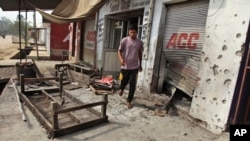Recent fighting across the Line of Control dividing disputed Kashmir is once more escalating tensions between India and Pakistan, with each side accusing the other of starting the violence. The artillery exchanges - the most serious since a 2003 cease-fire - are threatening newfound hopes for improved relations between the nuclear-armed neighbors.
India’s Prime Minister Narendra Modi, a self-declared Hindu nationalist, was elected in May having promised a “muscular” policy toward India’s neighbors, China and Pakistan. Once in office, he invited his Pakistani counterpart Nawaz Sharif to his inauguration, prompting talk of a “Nixon in China” moment. No one could question Modi’s national security credentials if he decided to make peace with Pakistan.
On the other side of the border was Sharif, a leader from that country’s most populous province Punjab. He too came from the right of the political spectrum, backed by traditionally conservative segments of society.
Here were two leaders with strong majority governments - a luxury in the Indian and Pakistani parliamentary systems - both business minded, both eyeing the economic fruits of peace, apparently ready to deal with one another.
This particular tango, however, required three dancers, not two. And the third, Pakistan’s powerful military, is not interested in better relations with India, according to regional experts based at several Washington think tanks. Real peace would mean an end to the army’s elite status as saviors of the country and possible reductions in its substantial economic power.
Political developments inside Pakistan have weakened Sharif. Shiv Shankar Menon, India’s former national security adviser, is one of many who see both the internal turmoil and the LOC tensions as part of a plan by the Pakistani military to keep control of the country’s foreign policy.
“Every time you have a leader in Pakistan who makes it clear that he wants to improve relations with India he seems to have trouble either at LOC or in terms of terrorist incidents,” Menon said recently at the Washington D.C.-based Brookings Institution.
Christine Fair, author of "Fighting to the End: The Pakistan Army’s Way of War," describes the current state of affairs as “Kargil in slow motion.” In 1999, during a previous Sharif-led administration, Pakistani paramilitary forces crossed the LOC into Indian-held territory at Kargil and stayed until international pressure forced a withdrawal. Gen. Pervez Musharraf, the head of Pakistan's army at the time, ousted Sharif in a bloodless coup later that year.
There have been intermittent exchanges of fire across the LOC since 2008, but none as serious as those at present. Fair, who teaches at Georgetown University, believes the current fighting serves two purposes for the Pakistani military -- to undermine Sharif's attempt at improving relations with India, and to test the resolve of the new Modi government in India.
"They understand full well that unlike Manmohan Singh who was willing to pursue some sort of peace with Pakistan at all cost, they know Modi is not up for that," she said.
Fair argues that the military's "probing operations" started the day Modi was inaugurated, when Pakistani-backed militants attacked the Indian consulate in Afghanistan’s Herat province.
Several Pakistan-based analysts dispute her analysis.
Shahzad Chaudhry, a retired air vice marshall of Pakistan’s air force, argues the military is too busy fighting militants on its own soil to want a fight with India.
“Why would the Pakistan military do such a think when it is already engaged in North Waziristan,” he asked.
Shahzad points out it was India, not Pakistan, that pulled out of foreign secretary-level talks in August, raising tensions between the countries. India says it left the talks because the Pakistani ambassador met separatist leaders from Kashmir despite an Indian warning not to do so.
Another Pakistan-based defense analyst, Gen. Talat Masood, says the military leadership in Pakistan is “somewhat surprised” at the way India is behaving.
The cross-border firing is occurring not only along the LOC -- which divides Kashmir between Indian- and Pakistani-held regions, but also along the de-facto border between Kashmir and Pakistan's undisputed territory.
Both Masood and Chaudhry say this is a matter of concern for Pakistan.
“We do not understand what India is trying to prove,” said Masood.
The answer may be found in the current and past rhetoric of top Indian leaders. Defense Minister Arun Jaitley has warned Pakistan that India will make the cost of its “adventurism….unaffordable,” while Home Minister Rajnath Singh has said he wants Pakistan to understand “the reality that times have changed in India.”
India’s new national security adviser, decorated spymaster Ajit Doval, has long advocated a policy of “defensive offense” against Pakistan.
According to Doval, India cannot take overtly offensive actions against Pakistan for fear of starting a nuclear war, but there are other ways to punish Pakistan for supporting terrorist activities inside India.
Doval explained his idea last year in a detailed lecture at the SASTRA Academy in Tamil Nadu, India, which was uploaded to YouTube:
“Pakistan’s vulnerabilities are many, many times higher than that of India. Once they know that India has shifted its gear from the defensive mode to defensive-offense they will find that it is unaffordable for them. You can do one Mumbai, you may lose Balochistan.”
Some analysts are already looking at India's behavior at the LOC as more punitive than reactionary.
Fair says the relatively dovish government of Prime Minister Manmohan Singh felt it had only two options, to “do nothing or go to war.” But the new administration in New Delhi may already be developing a range of options to be used against Pakistan.
“This could include, for example, using aircraft to bomb militant training camps across the LOC," Fair said. "That’s fair game, I think, in the eyes of this government and what would Pakistan do? Complain that Indians were bombing militant training camps?”
Once the Modi government develops these options, she added, it is “not going to be so easily blackmailed” by the idea that any conflict may lead to a nuclear war.











